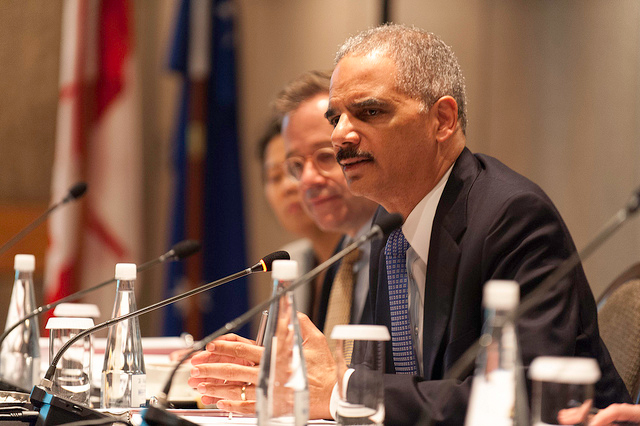
Well, well, well. Eric Holder is returning to his cushy job at Covington & Burling where he reportedly pulled in $2.5 million the last year he was there. Holder didn’t think it was strange he was returning to one of Wall Street’s most highly regarded defense firms after all the bankers he let breezily carry on with fraud, bribery, money laundering, tax evasion and plenty of other very prosecutable offenses during his tenure as US attorney general.
Holder explained simply: “The firm’s emphasis on pro bono work and being engaged in the civic life of this country is consistent with my worldview that lawyers need to be socially active.” Yeah, and what about the $2.5 million, Mr. Holder? That’s got nothing to do with it surely.
Holder had just spent six years in Washington handing out slaps on the wrist to financial institutions that claimed they were “too big to fail” while secretly receiving government assistance. His help almost certainly amounted to billions of dollars of aid to Wall Street. Now he’s trotting back on his high horse to go collect millions for his top position in the firm.
There should be a massive public outcry, an uproar reverberating across social media, demanding this issue be scrutinized by the federal government in an inquiry with a fine-toothed comb. But what is the actual response? A few articles in various magazines and newspapers, and that’s about it, ladies and gentlemen! Even those articles refused to point the finger at President Obama for tolerating in his administration someone who consistently toed Wall Street’s line. Long decried as a “socialist” by the Tea Party, Obama, through Holder’s nomination, has paradoxically endorsed the agenda of the GOP.
But let’s look for a moment at Eric Holder’s record during his tenure as Wall Street’s attorney general: He never got a single conviction for any crimes that spawned the worst financial crisis since the Great Depression. Instead, Holder employed some creative lawmaking and created the idea of “collateral consequences,” wherein the state could look for alternatives to prosecuting firms if the results were too much “collateral damage.” UBS and HSBC were caught manipulating interest rates and laundering money, respectively, and met with no criminal legal action as a result.
And so, Eric Holder effectively gave rise to a class of unprosecutable, untouchable individuals in the name of protecting the US economy. This is another way of saying he literally made the large financial firms more powerful than government. He oversaw the institutionalization of the backroom deal, deals made outside the reach of the law so that “too big to fail” firms would not have to face judicial action. Said Obama: “Some of the most damaging behavior on Wall Street – in some cases some of the least ethical behavior on Wall Street – wasn’t illegal.” Thus spawned the horribly skewed idea that Wall Street did nothing illegal to cause the 2008 meltdown. Holder said, “As a result of HSBC Bank USA’s AML failures, at least $881 million in drug trafficking proceeds – including proceeds of drug trafficking by the Sinaloa Cartel in Mexico … were laundered through HSBC Bank USA.” But Obama never talked about this, and he was never asked.
Whereas the Sinaloa Cartel was making ISIS-type torture footage, HSBC was instructing its employees to widen the windows of specific tellers so that they could accept larger boxes of bulk cash from the cartel. This is cold, hard fact, not rumor.
Now how could he have handled all this differently? After all, he claimed he was worried actual prosecution would have caused harm to the national economy. But his arguments simply don’t hold water. Take Iceland, for example: Without austerity measures and bailouts, Iceland let its banks go bust and emphasized social welfare policies. Iceland allowed those responsible for the crisis (bankers) to be prosecuted. Now Iceland’s economy has bounced back and is the only European country whose GDP surpassed its pre-crisis level. Was there any permanent damage to taking the right judicial approach in dealing with the situation? No, there was none. The country and its economy were strengthened in the long run and no one in government lost any face for letting those responsible off the hook.
Sadder still, Holder’s pervasive mentality of placing the financial system above the reach of the law because of potential systemic consequences found similar echoes across the pond. In contrast to the oft-repeated mantra portrayed in the mainstream media, the Greek bailout did not benefit the Greek taxpayer at all but went to straight to bankers. As former German National Bank Chief Karl Otto Pöhl admitted, the bailout “was about protecting German banks, but especially the French banks, from debt write-offs.” This speaks to a larger problem: By preaching the “too big to fail” gospel, Eric Holder and his ilk created what amounts to a self-fulfilling prophecy, whereby white-collar crime had to be dealt with in smoky backroom deals, further entrenching the idea that bankers who gamble away trillions would face no criminal consequences for fears of destroying the economy. But an economy that relies on the privileges of a few at the expense of the many is not worth saving.
Join us in defending the truth before it’s too late
The future of independent journalism is uncertain, and the consequences of losing it are too grave to ignore. To ensure Truthout remains safe, strong, and free, we need to raise $46,000 in the next 7 days. Every dollar raised goes directly toward the costs of producing news you can trust.
Please give what you can — because by supporting us with a tax-deductible donation, you’re not just preserving a source of news, you’re helping to safeguard what’s left of our democracy.